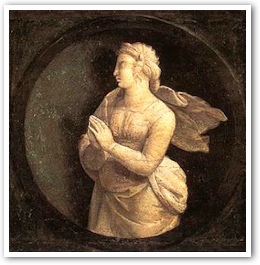Father and Son
- FR. KENNETH BAKER, S.J.
The Creed that we pray at Mass every Sunday devotes more space to explaining the unique relationship of Jesus, the Son, to the Father, than it does to any other single item.
 |
After proclaiming that Jesus is "the only Son of God", the Church goes on to say that he is "eternally begotten of the Father". We will now focus on this difficult expression.
When speaking of Father, Son and Holy Spirit we must always be very careful not to think and speak as if we are talking about three different gods. There is only one God, but in God there are three distinct Persons. The Creed explains in very succinct terms how the three Persons are related to each other. We would not even know that there are three Persons in one God if it were not for the revelation given to us by Jesus Christ, preserved and proclaimed by the infallible Roman Catholic Church.
By using the words "Father" and "Son" to designate the first and second Persons of the Trinity, we are using an analogy from human relationships. A father generates his son and the son is generated by his father. As a result of the sexual activity known as "generation" a special relationship is established between the father who generates and the son who is generated.
Sex, of course, is dependent on having a body and being a material substance. God, as we know, is wholly spiritual and independent of all material things. So there is no sexual activity in God. But since we must think about God in terms that are intelligible to us, in order to understand how one Person proceeds from another, we use the terminology of father, son and generation. There is sufficient justification for this in Scripture since Jesus calls God his Father and refers to himself as the Son.
In a sense, a son is a reflection or image of his father. He has the same nature and frequently even looks like his father. In the inner divine life there is something similar to this. Jesus is the "image" of th Father (Col 1:15). He is also the Word of God (Jn 1:1). A word or thought is a reflection of the reality it refers to. Since God is Spirit, he is a thinking and loving being. God is also absolutely one and simple, having no multiplicity of being in him whatsoever. This means that God's thought is identified with himself and with his existence.
What the Church teaches in this matter, leaning almost completely on Scripture, is that the Son proceeds from the Father by a process we call "generation" because the Son is the image of his Father. There is no sex involved, but since the Son (Jesus) is the perfect image of the Father and proceeds from the thought of the Father, there is some similarity between that and our experience of the relation between father and son. Hence, we proclaim that our Lord Jesus Christ is "eternally begotten of the Father". Please note that the Father begets only the Son, not the Holy Spirit.
Then there is that word "eternally". Eternity is opposed to time and it excludes all change and succession. Persons and things in time are subject to constant change. The Church says that Jesus is "eternally" begotten of the Father. The expression means that before the beginning of time the Son existed and always was the Son. There never was an age, so to speak, when the Son was not the Son.
This is difficult material but it is also important for our Christian faith. If it were not it would not be in the Creed. The essential points here are: 1) Jesus is the only Son of God, born of the Father; 2) from all eternity the Father has been the Father and the Son has been the Son. Thus the Son did not begin to exist with the conception of Jesus.
See the index of chapters from Fundamentals of Catholicism which have been reprinted to CERC here.
 This is J. Fraser Field, Founder of CERC. I hope you appreciated this piece. We curate these articles especially for believers like you.
This is J. Fraser Field, Founder of CERC. I hope you appreciated this piece. We curate these articles especially for believers like you.
Please show your appreciation by making a $3 donation. CERC is entirely reader supported.

Acknowledgement
Kenneth Baker, S.J. "Father and Son." In Fundamentals of Catholicism Vol. 1 Chapter 12 (San Francisco: Ignatius Press, 1995), 52-54.
This article reprinted with permission from Father Kenneth Baker, S.J.
The Author

 Father Kenneth Baker, S.J., assumed editorship of Homiletic & Pastoral Review in April 1971 and remained in this position for almost forty years. In 1983 he published a three-volume explanation of the faith called Fundamentals of Catholicism Vol. 1, Creed and Commandments; Vol. 2, God, Trinity, Creation, Christ, Mary; and Vol. 3, Grace, the Church, the Sacraments, Eschatology
Father Kenneth Baker, S.J., assumed editorship of Homiletic & Pastoral Review in April 1971 and remained in this position for almost forty years. In 1983 he published a three-volume explanation of the faith called Fundamentals of Catholicism Vol. 1, Creed and Commandments; Vol. 2, God, Trinity, Creation, Christ, Mary; and Vol. 3, Grace, the Church, the Sacraments, Eschatology


